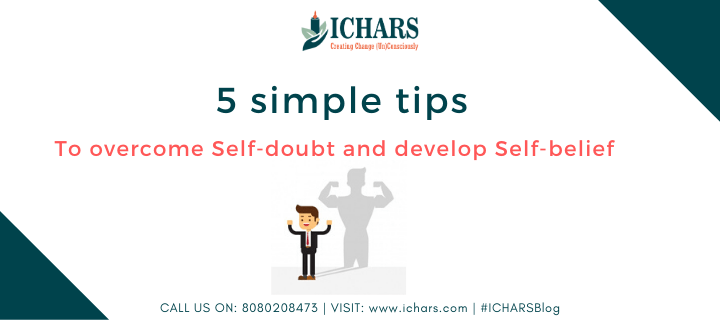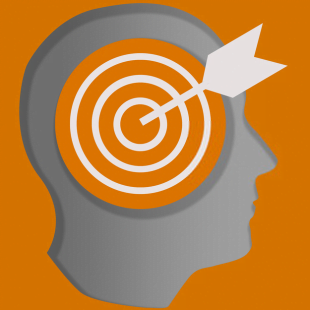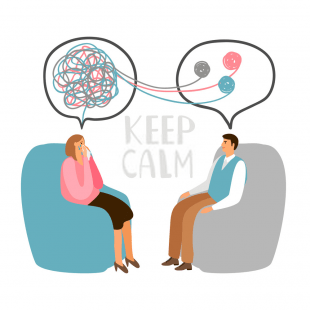Astha has clear goals in her mind. She is aware of the steps to be taken to reach her goals. But she constantly doubts herself and feels she won’t be able to do so. Presence of self-doubt and the lack of self-belief is constantly acting as a hindrance stopping her from achieving her goals.
We often hear people saying, “I know what to do, I have the blueprint in my mind but I doubt whether I will be able to do it.”
Does this happen with you too?
Self-doubt and Self-belief

Self-doubt or the lack of self-belief causes us to conjure up all kinds of things that will make it impossible for us to achieve our goals. On the other hand, a belief in oneself makes us imagine the possibilities of achieving the goals.
A person with self-doubt and lack of self-belief can write an entire book on reasons to explain why they are not capable enough to achieve what they wants. They may cite reasons like, “I have no college education”, “I am too young”, “bad luck”, “personal misfortune” and so on.
And each time they make an excuse, this self-doubt gets embedded even deeper within their subconscious minds. The person will move quickly from self-doubt to a firm belief like s/he is not capable or not worthy or not good enough and so on.
This lack of self-belief could manifest in any or all aspects of a person’s life – be it health, career, money, relationships, personal development, etc.
When a person expresses self-doubt, others may tell them, “It’s only in your imagination, don’t worry”. But this does not give us much relief and we keep doubting ourselves.
Self-doubt is the enemy of action and hence, success. It stops us from us from making the most of an opportunity, and prevents from getting us what we want from life.
In addition, a lack of self-belief can be directly traced to a mis-managed memory. One reason for this is that our brain is like a bank. We deposit our thoughts in this mind bank, which eventually grow and become our memory. And if we need to act, we automatically depend on our memory bank.
We tell it to recollect a past episode in which we were proven wrong, it obediently without questioning, does so and tells us “how inferior you are, Sir, to everybody else”, “Recall how you previously failed when you tried same thing”, “ Recall your school teacher telling you about your inability to accomplish things”.
And so, the brain goes on digging all examples which prove that you are inadequate.
But if we can tell ourselves to recollect incidents that reassure us about our ability to do things correctly, it will obediently do that too. It may help you recall the brilliant job that you did in a similar situation before, or “recall how much confidence your boss has in you”.
The mind bank lets us withdraw the thought deposits that we want to withdraw, after all it is our own bank. And for this, we need to deposit more positive thoughts.
In order to build a sense of self-belief, it is necessary to understand that self-belief is acquired and can be developed. This is a step-by-step process as we gradually aim higher with each step forward to build our self-belief and to overcome self-doubt.
Here are 5 easy ways to develop a sense of self belief.
5 Ways to develop self-belief and overcome self-doubt
Set Realistic Goals

A belief in oneself starts with little accomplishments, one at a time. Setting exceptionally high goals and not achieving these goals can worsen the situation. Do not demand too much, too fast, from yourself.
Acknowledge Accomplishments
Most of the people who lack self-belief, automatically have this tendency to filter out positive aspects about themselves.
What about you?
Do you acknowledge your achievements or do you just focus on your failures?
Even if you are not used to acknowledge your achievements, start practising doing so by spending some time listing them.
No comparison
Even though you may always find someone doing better than you, but comparing is like preparing to lose a battle. it may not be possible to completely eliminate comparison with others, but it is possible to reduce it.
Observe and Restructure thoughts that reflect self-doubt
Developing mindfulness and using it to observe once thoughts can be a very important step towards overcoming self-doubt. Obviously only observing these thoughts is not enough, it is also important to restructure these thoughts. You can use the powerful if-then statements to restructure these thoughts.
Visit a therapist or coach

There are times when self-doubt is deeply embedded in our minds due to certain experiences we have had in our life. If these experiences involve intense negative emotions then it may not be easy to overcome these doubts.
In such cases it is highly recommended that you visit a good therapist. Therapists can help you get over these past experiences and replace the negative emotions and self-doubt with self-confidence and other related emotions.
If you or someone you know would like to connect to a good therapist, feel free to call +91-8080-2084-73 or you can request a call back.
Therapists Niche to help clients over Self-Doubt and Lack of Self Belief
Self-doubt and lack of self-belief can prevent clients from living fulfilling lives. For therapists, helping clients overcome these challenges is crucial. The Cognitive Hypnotic Psychotherapy (CHP) framework integrates cognitive-behavioral strategies with hypnotic techniques to address these issues effectively.
Identifying the Root Cause: Using techniques like Corrective Therapy or SVIT™, therapists can help clients uncover the root causes of self-doubt. Hypnotic Regression Therapy can guide clients back to past events that may have instilled deep-seated doubts, allowing for resolution and healing.
Skill Development: For clients whose self-doubt stems from a lack of skills, the SOFT SEA Coaching model helps set realistic goals and develop necessary skills. This model breaks down tasks into manageable steps, gradually building self-belief.
Restructuring Negative Thoughts: When-Then Statements for Thought Restructuring and Anchoring techniques can replace negative thoughts with empowering ones, helping clients establish new, positive associations and trigger confidence when needed.
Inner Child and Regression Therapy: Inner Child Healing addresses unresolved issues from the past that contribute to current self-doubt. Healing the inner child releases past traumas and replaces negative self-beliefs with affirming ones.
Parts Integration and Submodality Techniques: Parts Integration resolves internal conflicts, creating a harmonious internal state. Submodality Techniques adjust how experiences are stored in the mind, altering their emotional impact and reducing self-doubt.
Empowerment and Self-Validation: Emotional Empowerment Techniques combine elements like tapping (EFT), affirmations, and breathwork to release trapped emotions and foster resilience. Self Validation & Integration Therapy helps clients acknowledge and integrate various parts of themselves, promoting a confident self-image.
Visualization and Future Planning: NLP Timeline Therapy and NLP Time Travel allow clients to reframe negative past experiences and envision positive future outcomes. These methods help clients see the potential for success, reducing self-doubt and increasing motivation.
By employing the Cognitive Hypnotic Psychotherapy framework, therapists can provide a personalized approach to help clients overcome self-doubt and build robust self-belief, leading to a more fulfilling and successful life.
If you are a psychologist looking to help clients develop healthy self-belief and overcome self-doubt, explore the internationally accredited Cognitive Hypnotic Psychotherapy Diploma. During the course you will learn to seamlessly integrate various psychotherapy approaches for optimal client outcomes.



